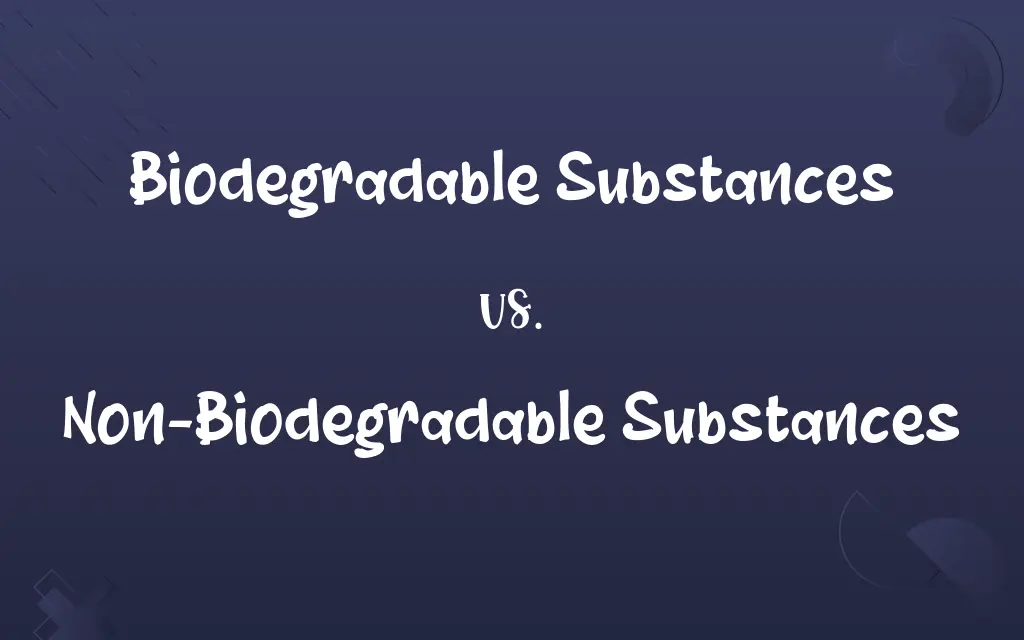Biodegradable Substances vs. Non-Biodegradable Substances: Know the Difference

By Shumaila Saeed || Published on February 29, 2024
Biodegradable substances naturally decompose through biological processes, whereas non-biodegradable substances do not break down naturally and persist in the environment.

Key Differences
Biodegradable substances are materials that decompose naturally by microbial action, returning to the environment without causing harm. Non-biodegradable substances, in contrast, resist natural decomposition and can persist for years, often accumulating in the environment.
Shumaila Saeed
Feb 29, 2024
Examples of biodegradable substances include food waste, paper, and certain fabrics, which break down within months to years. Non-biodegradable substances include plastics, metals, and glass, which can take hundreds to thousands of years to decompose.
Shumaila Saeed
Feb 29, 2024
The decomposition of biodegradable substances contributes to the nutrient cycle, enriching soil and supporting ecosystems. Non-biodegradable substances can lead to environmental pollution, harming wildlife and ecosystems.
Shumaila Saeed
Feb 29, 2024
Biodegradable substances are often seen as more environmentally friendly, as they reduce waste and resource consumption. Non-biodegradable substances pose significant waste management challenges and contribute to landfill overuse.
Shumaila Saeed
Feb 29, 2024
Recycling and proper waste management are crucial for non-biodegradable substances to mitigate environmental impact. Biodegradable substances can often be composted, returning nutrients to the earth.
Shumaila Saeed
Feb 29, 2024
ADVERTISEMENT
Comparison Chart
Decomposition
Naturally decompose through biological processes
Do not break down naturally, persist in the environment
Shumaila Saeed
Feb 29, 2024
Timeframe for Decomposition
Decompose within months to years
Can take hundreds to thousands of years
Shumaila Saeed
Feb 29, 2024
Environmental Impact
Generally eco-friendly, contribute to nutrient cycle
Lead to pollution and environmental harm
Shumaila Saeed
Feb 29, 2024
Waste Management
Can often be composted
Require recycling and careful disposal
Shumaila Saeed
Feb 29, 2024
ADVERTISEMENT
Biodegradable Substances and Non-Biodegradable Substances Definitions
Biodegradable Substances
Biodegradable substances are materials that decompose naturally.
The banana peel is a biodegradable substance that will break down in compost.
Shumaila Saeed
Jan 13, 2024
Non-Biodegradable Substances
Non-biodegradable substances do not decompose naturally.
Plastic bottles are non-biodegradable substances that accumulate in landfills.
Shumaila Saeed
Jan 13, 2024
Biodegradable Substances
They are often organic materials.
Cotton fabric is a biodegradable substance, unlike synthetic fibers.
Shumaila Saeed
Jan 13, 2024
Non-Biodegradable Substances
Non-biodegradable substances require recycling or special disposal.
Electronic waste is a non-biodegradable substance that needs proper disposal.
Shumaila Saeed
Jan 13, 2024
Biodegradable Substances
Biodegradable substances have a lesser environmental impact.
Paper bags are biodegradable substances, preferable to plastic for reducing pollution.
Shumaila Saeed
Jan 13, 2024
ADVERTISEMENT
Non-Biodegradable Substances
They are typically synthetic or man-made materials.
Polyester fabric is a non-biodegradable substance unlike natural fibers.
Shumaila Saeed
Jan 13, 2024
Biodegradable Substances
These substances are broken down by microbes.
Leaves and grass clippings are biodegradable substances easily processed by soil bacteria.
Shumaila Saeed
Jan 13, 2024
Non-Biodegradable Substances
These substances persist in the environment for long periods.
Styrofoam is a non-biodegradable substance that can last for centuries.
Shumaila Saeed
Jan 13, 2024
Biodegradable Substances
Biodegradable substances return nutrients to the soil.
Vegetable scraps are biodegradable substances that enrich garden compost.
Shumaila Saeed
Jan 13, 2024
Non-Biodegradable Substances
Non-biodegradable substances often lead to pollution.
Microplastics, non-biodegradable substances, are found extensively in ocean waters.
Shumaila Saeed
Jan 13, 2024
Repeatedly Asked Queries
What are biodegradable substances?
Materials that naturally break down through biological processes.
Shumaila Saeed
Feb 29, 2024
Why are non-biodegradable substances a concern?
They accumulate in the environment, causing pollution and harming ecosystems.
Shumaila Saeed
Feb 29, 2024
Can biodegradable substances harm the environment?
If not managed properly, they can contribute to methane production in landfills.
Shumaila Saeed
Feb 29, 2024
What defines non-biodegradable substances?
Substances that resist natural decomposition and persist in the environment.
Shumaila Saeed
Feb 29, 2024
Are all natural materials biodegradable?
Most natural materials are biodegradable, but there are exceptions.
Shumaila Saeed
Feb 29, 2024
Can biodegradable substances decompose in any environment?
Decomposition rates vary depending on environmental conditions like temperature and moisture.
Shumaila Saeed
Feb 29, 2024
Are plastics always non-biodegradable?
Most conventional plastics are non-biodegradable, but there are biodegradable plastics.
Shumaila Saeed
Feb 29, 2024
What happens to non-biodegradable substances in water?
They can persist for years, polluting water bodies and harming aquatic life.
Shumaila Saeed
Feb 29, 2024
How can we manage non-biodegradable waste?
Through recycling, reuse, and proper disposal methods.
Shumaila Saeed
Feb 29, 2024
Are biodegradable substances always eco-friendly?
Generally, yes, but their production and disposal methods also affect their environmental impact.
Shumaila Saeed
Feb 29, 2024
Can non-biodegradable substances be recycled?
Many, like metals and some plastics, can be recycled.
Shumaila Saeed
Feb 29, 2024
Are paper products biodegradable?
Yes, most paper products are biodegradable.
Shumaila Saeed
Feb 29, 2024
Are all synthetic materials non-biodegradable?
Most are, but some synthetic biodegradable materials are being developed.
Shumaila Saeed
Feb 29, 2024
Can we reduce non-biodegradable waste?
Yes, by reducing consumption, choosing biodegradable options, and recycling.
Shumaila Saeed
Feb 29, 2024
Do biodegradable substances decompose faster than non-biodegradable ones?
Generally, yes, they decompose much faster.
Shumaila Saeed
Feb 29, 2024
Do biodegradable substances release greenhouse gases?
Yes, they can release gases like methane if decomposed anaerobically.
Shumaila Saeed
Feb 29, 2024
What role do microbes play in decomposing biodegradable substances?
Microbes break down these substances, returning nutrients to the soil.
Shumaila Saeed
Feb 29, 2024
Is composting effective for biodegradable waste?
Yes, composting is an effective way to recycle biodegradable materials.
Shumaila Saeed
Feb 29, 2024
Can non-biodegradable substances be reused?
Many can be reused, reducing the need for new materials and waste production.
Shumaila Saeed
Feb 29, 2024
Share this page
Link for your blog / website
HTML
Link to share via messenger
About Author
Written by
Shumaila SaeedShumaila Saeed, an expert content creator with 6 years of experience, specializes in distilling complex topics into easily digestible comparisons, shining a light on the nuances that both inform and educate readers with clarity and accuracy.







































































